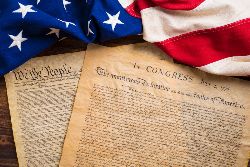 The first Plantagenet King of England, Henry II, is important to contemporary small business owners because he’s considered the founder of a legal system to which entrepreneurs owe their freedom to be.
The first Plantagenet King of England, Henry II, is important to contemporary small business owners because he’s considered the founder of a legal system to which entrepreneurs owe their freedom to be.
His intelligence only exceeded by his ambition, Henry’s attempts to consolidate all of the 12th-century British Isles under his rule created the need for order. And while his motivations were more for his own political expediency than to empower the people, Henry’s subsequent reforms actually gave birth to the legendary English Common Law, which replaced elements of the feudal system that included such enlightened practices as trial by ordeal.
Six centuries after Henry’s reforms, having been strengthened in 1215 by King John’s Magna Carta and the 1689 English Bill of Rights, great progress was achieved in the legal and cultural tide of personal and property rights. For example, in 1762, British statesman William Pitt, Sr. declared, “The poorest man may in his cottage bid defiance to all the forces of the Crown. It may be frail — its roof may shake — the wind may blow through it — the storm may enter — the rain may enter — but the King of England cannot enter — all his force dares not cross the threshold of that ruined tenement!”
Concurrent with the expansion of English reforms, across the Atlantic in the colonies a group of now-legendary malcontents we call America’s Founders envisioned and created an extraordinary variation on Pitt’s promise. That variation was a world sans kings.
In The Fortune of the Republic, Ralph Waldo Emerson wrote, “We began with freedom. America was opened after the feudal mischief was spent. No inquisitions here, no kings, no dominant church.”
In Origins of the Bill of Rights, Leonard W. Levy noted that, “Freedom was mainly a product of New World conditions.”
Those conditions, like Thomas Jefferson (and his committee of five) so artfully crafted in the Declaration of Independence were, “…life, liberty, and the pursuit of happiness.” Approved by the Continental Congress on Thursday, July 4, 1776, those 18th-century words represented dangerous ideas for which the 56 co-signers of this revolutionary document put their lives at risk. They were on a quest to claim that relatively new and more powerful promise – liberty. Sans kings.
But America’s founding documents weren’t perfected until they perpetuated rights that were, as John Dickinson declared a decade earlier in 1766, “…born with us, exists with us and cannot be taken from us by any human power without taking our lives.” He was describing liberty.
The Founders knew that freedom isn’t an American franchise – it’s a blessing from God found around the world. But freedom to pursue dreams wherever they take us – aka, personal independence – is the very American ideal the Founders claimed and called liberty. And for two-and-a-half centuries, liberty has been a contract of personal independence that Americans have given to each other as we pledge devotion to the secular scripture from whence we claim that promise: the Constitution of the United States. Thank you, Founders.
By definition, entrepreneurs take risks. But those risks are only acceptable when freedom converts into the liberty to claim personal rights and pursue sustained and accrued success. Thank you, King Henry and King John.
The American experiment has revealed that a healthy entrepreneurial environment fosters national economic well-being. Today, 21st-century global research shows a direct connection between the rate of individual business start-ups and a nation’s macro-economic health. Clearly, without the Founder’s vision, courage, sacrifice, and devotion to liberty, it’s doubtful that entrepreneurship as we know it would exist today. And if capitalism is the economic lever of democracy, entrepreneurship is the force that renews the strength and reliability of that lever for each new generation. Thank you, America’s entrepreneurs.
We began with freedom and entrepreneurial liberty was born. To dream and to try; to succeed and to fail; to own and to enjoy; to accumulate and to pass on to the next generation. Thank you, Founders.
Write this on a rock … America began with freedom, liberty was made manifest, and the world is the better for it. Happy Independence Day America.
